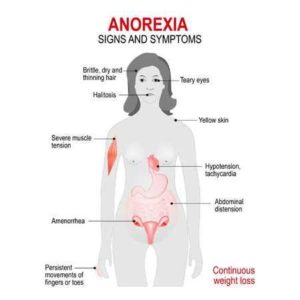Anorexia nervosa is a psychiatric disorder characterized by obsessive dieting

and intense fear of being overweight. Anorexia nervosa is a serious eating disorder occurs most often in teenage girls and young women. People with anorexia nervosa are obsessed with being thin and have a distorted perception of their bodies. They believe that they are fat and avoid eating. They exercise excessively in order to burn extra calories, they may even induce vomiting in order to compensate over eating.
Causes of anorexia nervosa
The exact cause of anorexia nervosa is unknown. There may be so many factors associated with anorexia nervosa like hormones, genes, and social factors.
There are few risk factors which may involve:
-Over consciousness regarding weight and body shape.
-Social and family expectations and pressure about health and beauty
-Child suffering from anxiety disorder
-Disaffection form body image
-People who try to be perfectionist
-People who have family history of eating disorders
-Who are not happy with relations, with low self esteem
Symptoms of anorexia nervosa
-No desire to eat anything
-Excessive exercising
-No desire or refuse to have food in front of others
-Immediate vomiting after eating
-Distorted body image
-Hair loss
-Depression
-Dryness of skin
-Muscular weakness
-Easy fatigue
-Malaise
-Low blood pressure
-Hypoglycemia
-Brittle nails
-Confusion of thoughts
-Low self esteem
-No inclination to mental or physical work
-Slower respiratory rate
-Dryness of mouth
Key diagnosis signs of anorexia nervosa
-Fear of becoming fat or gaining weight
-Women with absence of menses (at least 3 consecutive menstrual cycles)
-A distorted self evaluation of body shape and weight
-Refusal to maintain body weight at or above a minimally normal weight for age and height
As weight loss is the key feature of anorexia nervosa so to rule out other causes of weight loss following tests is required:
-Complete blood count
-Liver function test
-Urinalysis
-Kidney function tests
-ECG
-Thyroid function test
-Bone density test
-Screening for patients with questioners, interviews may also be useful in the diagnosis of anorexia nervosa.
Complications of anorexia nervosa
-Severe malnutrition
-Severe dehydration
-Impaired bowel movements
-Thyroid dysfunction
-Impaired heart functions
-Bone weakening
-Recurrent infections
-Swelling or bloating of body parts
Treatment of anorexia nervosa
Along with medication few practices like
-Increased social activities
– having proper schedule for eating
-reduce over exercises behavioral therapy
-group therapy and family therapy can also be beneficial.
Homeopathic treatment of anorexia nervosa
 Homeopathy is one of the most popular holistic systems of medicine. The selection of remedy is based upon the theory of individualization and symptoms similarity by using holistic approach. This is the only way through which a state of complete health can be regained by removing all the sign and symptoms from which the patient is suffering.
Homeopathy is one of the most popular holistic systems of medicine. The selection of remedy is based upon the theory of individualization and symptoms similarity by using holistic approach. This is the only way through which a state of complete health can be regained by removing all the sign and symptoms from which the patient is suffering.
The aim of homeopathy is not only to treat anorexia nervosa but to address its underlying cause and individual susceptibility.
As far as therapeutic medication is concerned, several remedies are available to treat anorexia nervosa that can be selected on the basis of cause, sensations and modalities of the complaints.There are following remedies which are helpful in the treatment of anorexia nervosa:
Antim crud ,calc phos ,ars alb , lyco ,carcinocin , hyoscymus etc .
For individualized remedy selection and treatment, the patient should consult a qualified homeopathic doctor in person.


